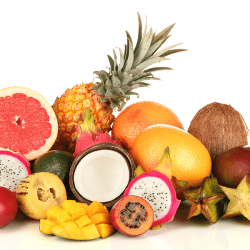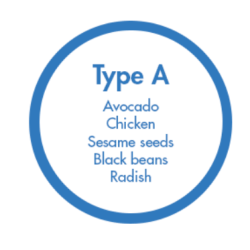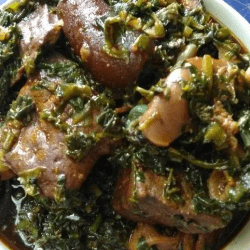People with blood group A are to avoid eating much of:
- Beef
- Banana
- Cow’s Milk
- Tomatoes
- Eggplant
- Orange
- Potatoes
- Garbanzo Beans
- Cabbage
- Pork
- Wheat Pasta
- Tea (Black)

Eat more of:
- Salmon
- Fig
- Soy Milk
- Beet
- Portobello Mushroom
- Grapefruit
- Turnip/Parsnip
- Lentils
- Kale
- Cod
- Spelt Noodles
- Coffee

- ❏ Soy milk ❏ Eggs ❏ Ghee ❏ Mozzarella cheese ❏ Feta cheese Ricotta ❏ Goat cheese
- ❏ Tofu ❏ Tempeh ❏ Chicken ❏ Turkey ❏ Cod ❏ Salmon ❏ Red snapper ❏ Trout
- ❏ Artichokes ❏ Broccoli ❏ Carrots ❏ Celery ❏ Fennel ❏ Kale ❏ Lettuce ❏ Onions ❏ Pumpkin (when in season) ❏ Spinach ❏ Apricots ❏ Blueberries ❏ Cherries ❏ Figs ❏ Pineapple ❏ Grapefruit
- ❏ Olive oil ❏ Walnut oil ❏ Flaxseeds ❏ Walnuts ❏ Peanuts ❏ Peanut butter ❏ Pumpkin seeds ❏ Adzuki beans ❏ Soy beans ❏ Lentil beans ❏ Black-eyed peas ❏ Brown rice bread ❏ Soy sauce ❏ Garlic ❏ Ginger ❏ Ginger tea ❏ Chamomile tea ❏ Green tea ❏ Coffee Red wine
- ❏ Brown rice flour ❏ Buckwheat flour ❏ Oat flour ❏ Spelt flour ❏ Brown rice flour ❏ Baking powder ❏ Sea salt ❏ Agave ❏ Blackstrap molasses

Diet Profile
Largely vegetarian: vegetables, tofu, seafood, grains, legumes, fruit, turkey
Quick Food Reference
Avoid: meat, dairy, kidney beans, lima beans
Beneficial: olive oil, seafood, vegetables, pineapple
Strengths
Ability to adapt well to dietary and environmental variety
System synchronized to preserve and metabolize nutrients efficiently
Weaknesses
Difficulty digesting and metabolizing meat protein
Vulnerable immune system, open to microbial invasion
Medical Risks
Heart disease, type I and type II diabetes, cancer
Liver and gallbladder disorders
Blood group diet criticisms
In his book, Eat Right 4 Your Type, naturopathic physician Dr Peter D’Adamo claims that the optimal diet for any one individual depends on the person’s blood type.①
The book was incredibly successful. It was a New York Times bestseller, sold millions of copies.
However, the diet D’Adamo proposes for different blood types is in several cases suitable for all.
Also, discouraging people of certain blood groups some foods can be counter productive for their health and making people to consume too much of a certain line of foods may sometimes cause health issues.

Thoughts
The blood group diet theory lacks sufficient scientific evidence. The list of foods on it is OK but not restricted to blood group.
Any of these dietary patterns would be an improvement for most people, no matter what their blood type is.
So, even if you go on one of these diets and your health improves, it doesn’t necessarily mean that it had anything to do with your blood type.
All 4 diets (or “ways of eating”) are mostly based on real, healthy foods, and a huge step up from the standard Western diet of processed junk food.
If you got great results on the blood type diet, then perhaps you simply found a diet that happens to be appropriate for your metabolism. It may not have had anything to do with your blood type.
Also, this diet removes the majority of unhealthy processed foods from people’s diets.
Perhaps that is the single biggest reason that it works, without any regard to the different blood types.
Risks of following a blood type diet
Despite the lack of scientific evidence of the blood type diet, it remains a topic of discussion in the diet culture.
The four diets in the blood type diet emphasize eating healthy whole foods and exercising, which can be beneficial to your health. But the diet could still be risky.
For example, the O blood type diet emphasizes a high intake of animal proteins, which may lead to other health problems.③
Your blood type alone doesn’t determine your overall health, and you may put yourself at risk by engaging in the blood type diet without taking other foods that might be of help to your body.
References
① https://dadamo.com
② https://www.4yourtype.com
③ https://www.healthline.com/health/O-positive-blood-type-diet#risks






